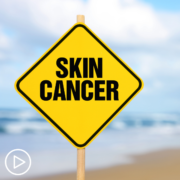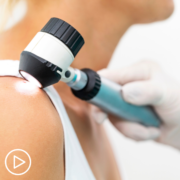How Is Advanced Non-Melanoma Skin Cancer Staged?
How Is Advanced Non-Melanoma Skin Cancer Staged? from Patient Empowerment Network on Vimeo.
Skin cancer expert Dr. Vernon Sondak describes how advanced non-melanoma skin cancer is staged and explains which factors are taken into consideration to understand an individual’s diagnosis.
Related Resources:

|

|

A Review of Current Advanced Non-Melanoma Skin Cancer Treatment Options |
Transcript:
Katherine:
And we are going to focus today on advanced disease. So, what makes this type of cancer considered advanced?
Dr. Sondak:
So, this also is somewhat – I won’t say controversial. I’ll just say it’s not uniformly agreed on by everybody. Not everyone means the exact same thing or has the exact same definition in their mind when they say advanced.
It’s a little different than the stage. The staging of skin cancer is mostly based on the size. So, a small skin cancer is almost never an advanced skin cancer. By small I mean less than 2 centimeters, sometimes. Depending where. Two centimeters is just under an inch.
But 2 centimeters in the middle of your face or on the tip of your nose. That’s already a pretty big problem. So, somebody might say, “Well, that’s kind of advanced.” Yes it is. But that’s not what we’re really talking about here. We’re talking about larger tumors. Tumors that have spread deeply into the tissues, or tumors that have spread and gotten to the next stages. Stage III, meaning in the lymph nodes. Or stage IV, meaning it’s spread beyond the lymph nodes, to the lungs and beyond.
In terms of stages, in terms of stage III and stage IV, basal and squamous cell cancers, we are talking about much fewer than 2 percent of all those skin cancers. For basal cell, way fewer. For squamous cell, slightly fewer than 2 percent of all cases ever getting to a higher stage, like stage III and stage IV.
Sometimes they can be very advanced without ever spreading to the lymph nodes or beyond because they invade down into the bone. Could be on the top your scalp and invade down into your skull bone. Can be on the cheek, and invade, and follow the track along the nerves of the face. A lot of ways that the skin cancer can become advanced without spreading. But cancers that have spread are automatically considered advanced.
Katherine:
Right. That helps us understand the disease and how it progresses.




